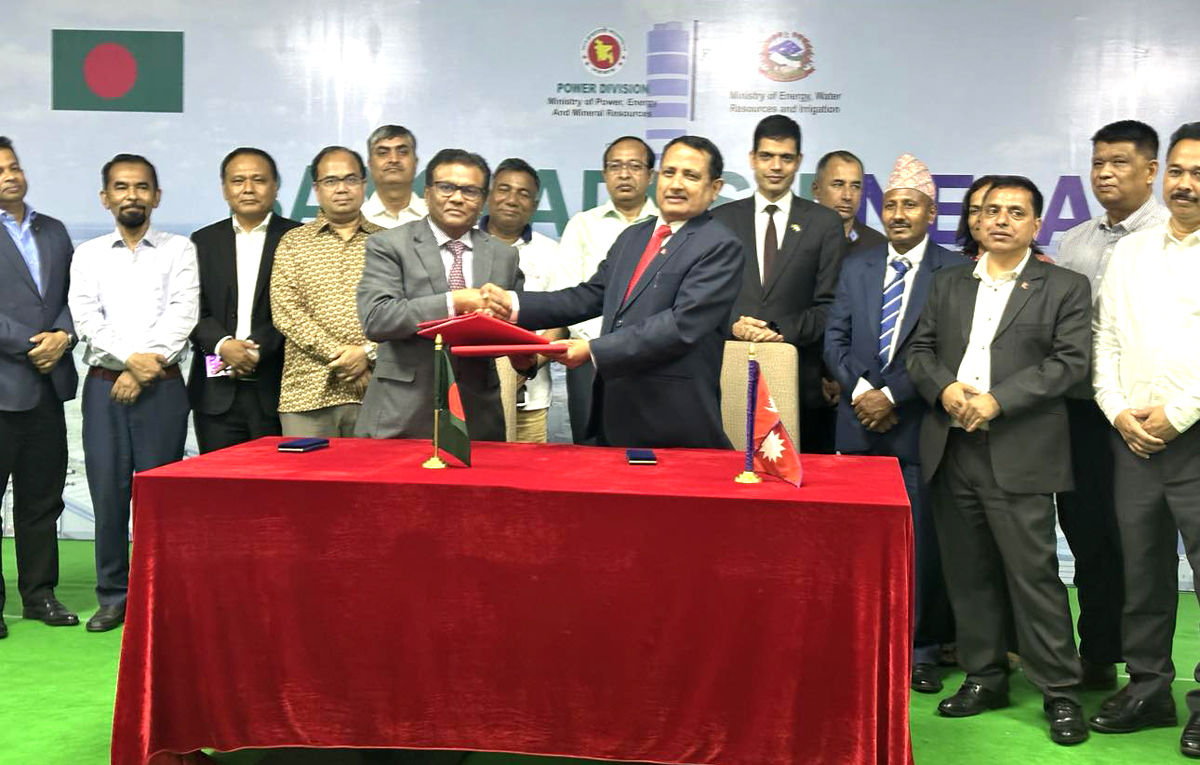
Kathmandu; Nepal and Bangladesh have agreed to sign a Joint Venture Agreement (JVA) for establishing a new company within the next six months for the development of the 683 MW Sunkoshi-3 Storage Hydropower Project. The two countries reached a consensus in the 5th joint meeting of energy secretaries of both countries held in Patuwakhali, Bangladesh, on Tuesday (May 2).
Dinesh Kumar Ghimire, secretary of the Ministry of Energy, Water Resources and Irrigation (MoEWRI) informed that it has been agreed to sign a Joint Venture Agreement (JVA) for the project development within the next six months. Nepal Electricity Authority (NEA) and Bangladesh Power Development Board (BPDB) of Bangladesh will be signing a memorandum of understanding on behalf of their respective countries.

The meeting co-chaired by the Secretary Ghimire and Energy Secretary of Bangladesh Mohammad Habibur Rahman, also discussed of construction of Sunkoshi-3 and cross-border electricity trade. Likewise, the panel also discussed and approved the recommendations forwarded by the meeting of the Joint Working Group (JWG) held on Monday. The JWG meeting was co-chaired by Madhu Prasad Bhetuwal, joint secretary of the MoEWRI, and his Bangladeshi counterpart Syed Masum Ahmed Choudhury.
Earlier, the two countries had reached a consensus at the secretary-level meeting held in Kathmandu in August 2022, to establish a joint entity to take forward construction of the Sunkoshi-3. So far, the project has finalized the feasibility study and environmental impact assessment report, according to the NEA.

During the discussion, Bangladesh informed that the Power Sales Agreement (PSA) between BPDB and GMR, India, regarding the purchase of electricity produced by the Upper Karnali Hydroelectric Project has reached its final stage and the agreement will be signed as soon as possible. Bangladesh has been expressing its interest to purchase the Upper Karnali-produced electricity.
Earlier, in the 10th Nepal-India Energy Secretary-level meeting held in Mount Abu, India, it was agreed that India would allow Bangladesh to import 50 MW of Nepal-produced electricity. However, a tripartite meeting between Nepal, India and Bangladesh has not yet been held on this issue.
Section 5 of the MoU concluded on August 10, 2018, provisioned the formation of JSC and JWG in order to facilitate, guide and monitor the progress of the implementation of the bilateral agreement.
Key decisions of the joint meeting
1. To export up to 40 MW of electricity produced in Nepal to Bangladesh, Power Sales Agreement will be signed among NEA, India’s NTPC Power Trading Corporation and Bangladesh’s BPDB as soon as possible.
2. To sign a joint venture agreement (JVA) between NEA and BPDB within 6 months from the construction and development of the Sunkoshi-3 Hydroelectric Project.
3. To direct the Joint Technical Team on Power Transmission Line to study the possible options of cross-border transmission lines for electricity trade between Nepal and Bangladesh and submit a report within 6 months.
4. To facilitate the private sector of Bangladesh for investment in the hydropower sector of Nepal.
5. To complete the necessary administrative procedure to ink the draft Memorandum of Understanding prepared for cooperation in alternative energy between Nepal’s Alternative Energy Promotion Center and Bangladesh’s Sustainable and Renewable Energy Authority.
6. To take initiatives from both sides to establish a high-level tripartite administrative mechanism for cooperation in the electricity sector including electricity trade and construction of interstate transmission lines between Nepal, Bangladesh and India.
Brief description of Sunkoshi-3
In 1985, Sunkoshi-3 was identified in the Koshi Basin Master Plan prepared by the Japan International Cooperation Agency (JICA). The project, located at a distance of 95 km from Kathmandu, connects Kavrepalanchok, Ramechhap, Sindhupalchok, Dolakha and Sindhuli districts.
This project study which has been carried out since 2017, is now being considered for the detailed study. According to the preliminary study, the height of the dam is estimated to remain at 180 meters.
The cost of the project, which will produce 2,356.27 gigawatt hours of electricity annually, is estimated to be around Rs 150 billion rupees. A study has shown that the construction of the Sunkoshi-3 Hydroelectric Project will form a lake of 45 km long starting Lubhughat.
The project will submerge 3,237 hectares of land including 655.9 hectares of forest area. Similarly, 11,773 people from about 1,565 households will be displaced due to the project, shows the study.